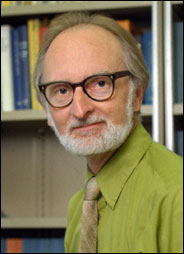Owen Chamberlain (1920-2006) was an American physicist and winner of the 1959 Nobel Prize.
He joined the Manhattan Project in 1942 after his graduate studies were interrupted by World War II. Chamberlain worked under Professor Emilio Segre at the University of California, Berkeley and at Los Alamos. He investigated nuclear cross sections for intermediate-energy neutrons and the spontaneous fission of heavy elements, and was present for the Trinity test in 1945.
After the war’s end, Chamberlain traveled to Hiroshima and was profoundly disturbed by the experience, which led to an interest in causes including human rights, nonviolence, and free speech.
Scientific Contributions
Chamberlain was awarded the 1959 Nobel Prize in Physics for work with Segre and the discovery of the antiproton. Chamberlain conducted many experiments on the interactions of antiprotons with hydrogen and deuterium, the production of antineutrons from antiprotons, and the scattering of -o mesons.





